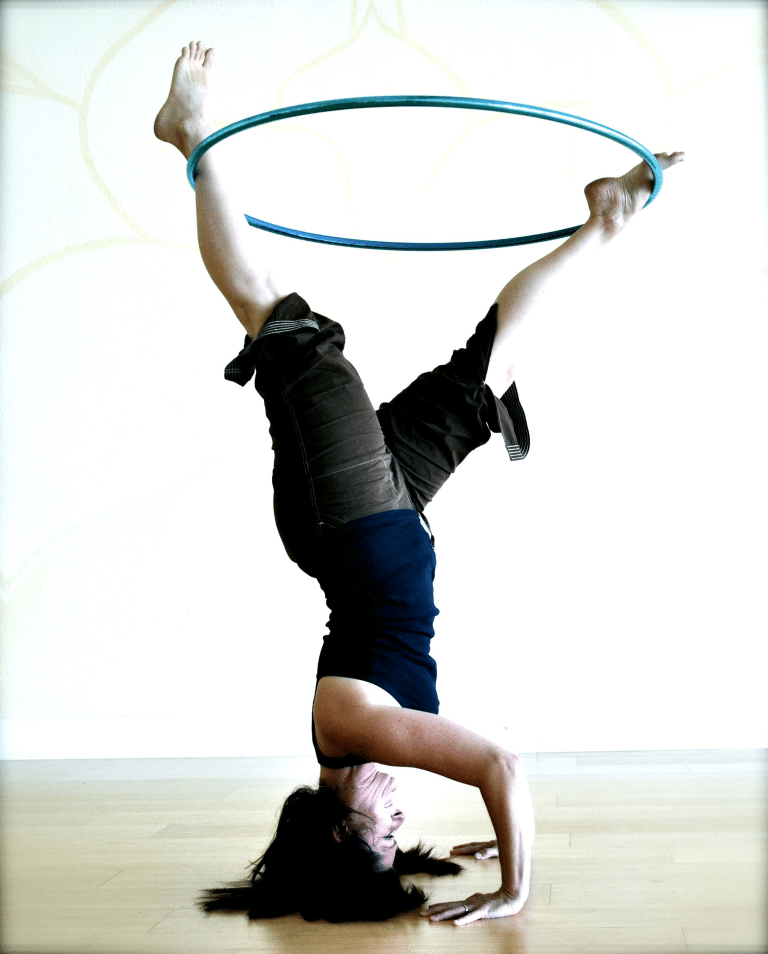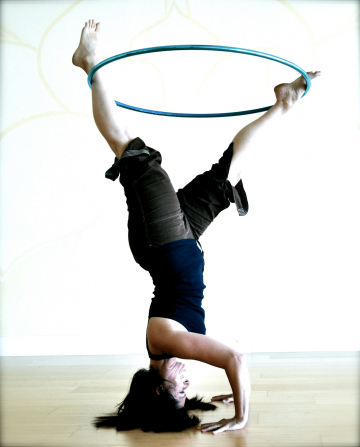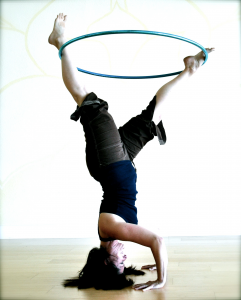Guest Post by Laurie, as part of the Doves & Serpents and The Exponent Blog Swap.
There is a yoga studio in my area advertising a class called “Fun-damentals”. Under the description, it reads, “This class is for Beginning and Advanced students ONLY. No intermediates allowed. They think they know everything.” When I read it, I laughed out loud because it is SO true! After somebody has been practicing yoga for a while, they feel as if they’ve heard it all. They know their bodies, their strengths and weaknesses. Their bad habits are so entrenched they don’t even notice them. They fly on auto-pilot.
When students begin a new practice, the process of learning is exciting, the a-ha moments are plentiful, and they learn ways of living more skillfully. However, at some point along the way, a funny thing inevitably takes place. They hit a saturation point and become comfortable in their level of skill and knowledge and lose the same voraciousness for learning.
Students who practice long enough through the status quo begin to get little hits, realizing that the more they know, the less they know. Perhaps there’s an injury that wakes them up to a specific misalignment. They may end up with an unexpected substitute teacher who says just the right thing to spark a new curiosity. Perhaps their body slips into a pose that was previously elusive, reminding them of their unlimited potential. Whatever it is, it usually happens – and it sends those “advanced” students right back into the beginner’s class with a new found sense of curiosity and patience.
Several years back, I was talking with a good LDS friend of mine about the holes I was finding in the LDS gospel and my struggles to believe whole-heartedly. She shared her love for the LDS lifestyle and all the joy it had brought to her life. Then, like the smarty-pants that she is, she asked, “I’m not wired the way you are. I don’t dwell on all of those details and I’m happy. Just what is it that you want out of religion, anyway?” It was then that it hit me for the first time. “Enlightenment.” I admitted. “I want to see past my own limited, singular perspective. I want to experience that kind of intense clarity.”
It was an audacious statement and I immediately wished I could retrieve it. As I said the words, I knew they would come back to bite me in the ass, and I realized that I had essentially just asked the universe to illuminate every possible way I was “wrong” or delusional. I was asking to lose a debate on a daily basis, and to be sent back to the beginner’s class every day. I was setting the intention to sit at a meal of humble pie, when so often I don’t really have the stomach for it. The truth? Breaking up with the ego is hard to do.
When I quake in my boots about the path I’ve chosen, I find myself so grateful for amazing teachers like Pema Chodron, who elaborated in her book, The Places that Scare You:
Sometimes egolessness is called no-self. These words can be misleading. The Buddha was not implying that we disappear—or that we could erase our personality. As a student once asked, “Doesn’t experiencing egolessness make life kind of beige?” It’s not like that. Buddha was pointing out that the fixed idea that we have about ourselves as a solid and separate from each other is painfully limiting. It is possible to move through the drama of our lives without believing so earnestly in the character that we play. That we take ourselves so seriously, that we are so absurdly important in our minds, is a problem for us. We feel justified in being annoyed with everything. We feel justified in denigrating ourselves or in feeling that we are more clever than other people. Self-importance hurts us, limiting us to the narrow world of our likes and dislikes. We end up bored to death with ourselves and our world. We end up never satisfied.
We have two alternatives: either we question our beliefs—or we don’t. Either we accept our fixed versions of reality—or we begin to challenge them. In Buddha’s opinion, to train in staying open and curious—to train in dissolving our assumptions and beliefs—is the best use of our human lives.
When we train in awakening bodhichitta, we are nurturing the flexibility of our mind. In the most ordinary terms, egolessness is a flexible identity. It manifests as inquisitiveness, as adaptability, as humor, as playfulness. It is our capacity to relax with not knowing, not figuring everything out, with not being at all sure about who we are—or who anyone else is either.
So I roll out my yoga mat and remind myself to meet those sun salutations with the same curiosity I held on day one of yoga. The circular nature of practice hits me. To become more skilled, more graceful, more integrated and unified – in essence, more advanced – it requires me to be a beginner in this moment. To stay open enough to recognize clarity when it comes my way in unfamiliar forms, and humble enough to unlearn the bad habits that I’ve spent my life establishing. Sometimes it’s fun and exciting, sometimes it’s uncomfortable or scary, and mostly – it just seems completely intangible. But in those moments when I am able to embody the beginner’s mind, it’s always liberating.







15 Responses
[…] in: Ride to ChurchToday’s Ride to Church comes to us from Jessawhy today’s guest for The Exponent and Doves and Serpents Blog Swap.“Hi, I’m Jessawhy, I live in Mesa Arizona with my husband and three sons and I blog at […]
Great post. I know I will always be a beginner at yoga, but perfection isn’t my goal. Neither is enlightenment which is, after all, a fairly egotistic goal.
Enlightenment seems like an egotistical goal, but it’s actually the exact opposite! It is the dissolving of the ego, in a sense. It’s an odd thing to reach for, because the minute we “want” it, we won’t get it. What a challenge to strive to see more clearly, without viewing “attaining” enlightenment through a 10-step goal, or a materialistic destination to acquire.
I’m with you on perfection. My definition of an advanced yoga practitioner, is one who knows their body and how to work with it and honor it. I see a lot of people in my yoga classes who can do some impressive yoga tricks, yet still can’t take one full deep breath. I see a lot of people with tight hamstrings in a simple triangle pose, supported with a brick, breathing and releasing and opening with beautiful, yet limited form. So advanced…!
I love the way you described this. I think this is something that life does for us, with or without our intentions. And so being aware of it and opening oursleves up to questioning our delusions and egos is really about opening ourselves to the way things are.
Definitely. I love that phrase – the way things are. I’m still trying to figure out why my natural instinct is to resist the way things are!
Beautifully written, I loved the quote by Pema Chodron
Laurie, you know I’m not a yoga fan, but I can definitely relate to the beauty (and the fear factor!) of putting yourself in the beginner’s shoes.
Thank you for sharing. It totally agree. I also love the picture. I aspire to be that yogi …
What a great post. I love yoga (and I love the photo, sorry it wasn’t up earlier. I could see it on my computer!).
The first time I went to yoga I felt like I found a new piece of myself I didn’t know what missing. Now I go and it feels more like exercise, strength and stretching. It just depends so much on the teacher whether I can make the spiritual connection or not.
Enlightenment seems like such a noble goal, but so far out of reach of my real life. It’s almost like a fairy tale, I guess. How do you make something so esoteric as enlightenment part of your everyday drudgery?
I often feel the same way about yoga. It’s a hard call to decide what is worse – yoga classes offered as pure exercise (belch!), or a yoga teacher spouting esoteric junk out of her/his a$@. I find both annoying, which tells you a lot about what my real yoga practice is. (Trying not to be judgmental and annoyed) That said, I’ll travel miles to take class with certain teachers who have a way of opening me up and helping me stay in that beginner mode. There’s such a value in a teacher who can offer an authentic and safe space to practice in.
Love this post Laurie.
Great post, Laurie! I think this idea is similar to when the scriptures tell us to be like little children. I sometimes don’t like that idea because shouldn’t we always be learning and growing and maturing, instead of staying children forever? But this idea of being open and humble like a child or beginner is beautiful.
Beautiful post, Laurie! I found this part particularly touching, “Buddha was pointing out that the fixed idea that we have about ourselves as a solid and separate from each other is painfully limiting. It is possible to move through the drama of our lives without believing so earnestly in the character that we play….We feel justified in denigrating ourselves or in feeling that we are more clever than other people.”
This reminds me of 1 Corinthians 12 where Paul talks about members of the Church being the body of Christ as we loose ourselves in the sharing of our individual spiritual gifts, working towards a common goal. I like how this Buddhist concept goes beyond what Paul is saying, reminding me also to not narrow my definition of self.
All I can say is a profound thank you.
Fortunately I’m still pretty firm in beginner status with yoga. Thanks for the reminder not to put too much pressure on myself for advancing. 😉 I’m also very lucky to have a teacher that teaches to all levels in her class and keeps it very simple and yet pushes us to challenge ourselves individually if it feels right and to keep energy flowing and not stuck. She has never used the words, but I have learned so much from her example of how to accept the present moment and all that I am when I’m in it.